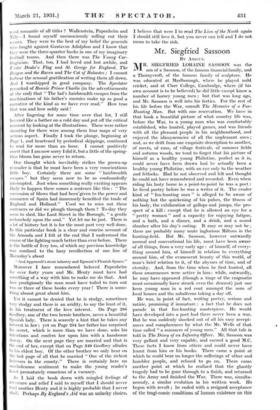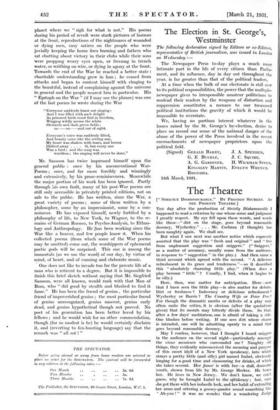Mr. Siegfried Sassoon By AMICUS.
MR. SIEGFRIED LORAINE SASSOON was the son of a Sassoon, of the famous financial family, and a Thornycroft, of the famous family of sculptors. He was educated at Marlborough, where he played mild cricket, and at Clare College, Cambridge, where (if his own account is to be believed) he did little except know a number of horsey young men ; but that was long ago, and Mr. Sassoon is well into his forties. For the rest of his life before the War, consult The Memoirs of a Fox- Hunting Man. But with one reservation. We have in that book a beautiful picture of what country life was, before the War, to a young man who was comfortably established, who hunted, played games, and was friends with all the pleasant people in his neighbourhood, and enjoyed the idiosyncracies of all the unpleasant ones ; and, as we drift from one exquisite description to another, of meets, of runs, of village festivals, of summer fields and autumn woods, we tend to forget that his picture of himself as a healthy young Philistine, perfect as it is, could never have been drawn had he actually been a healthy young Philistine, with an eye only to the weather and fetlocks. Had he not observed and felt and thought he could not have remembered and recorded. Even when riding his lusty horse in a point-to-point he was a poet : he lived poetry before he was a writer of it. The cruder kind of " fox-hunting man " is alleged to be aware of nothing but the quickening of his pulses, the fitness of his body, the exhilaration of gallops and jumps, the pro- spect of a kill : except that he is allowed an eye for a " pretty woman " and a capacity for enjoying fatigue, and a bath, and a dinner, and a drink, and a sound slumber after his day's outing. It may or may not be there are probably many mute inglorious Miltons in the hunting-field. But Mr. Sassoon, however outwardly normal and conventional his life, must have been aware of all things, from a very early age : of himself, of every- thing around him, of himself in relation to everything around him, of the evanescent beauty of this world, of man's brief relation to it, of the abysses of time, and of eternity. And, from the time when he first hunted, all these awarenesses were active in him : while, outwardly, he may have appeared (though a tinge of the enigmatic must occasionally have struck even the densest) just one keen young man in a red coat amongst the sons of local houses and the subalterns taking a day off.
He was, in point of fact, writing poetry, serious and satiric, promising if immature : a fact that he does not parade in that fox-hunting masterpiece. He would have developed into a poet had there never been a war. But he was suddenly shocked out of all his easy accept- ances and complacences by what the Mr. Wells of that time called " a massacre of young men." All that tale is told in The Diary of an Infantry Officer. Mr. Sassoon was very gallant and very capable, and earned a good M.C. These facts I know from others and could never have learnt from him or his books. There came a point at which he could bear no longer the sufferings of other and humbler people, and refused to go on. There came another point at which he realized that the ghastly tragedy had to be gone through to a finish, and returned to the Army and finished the War. There was, simulta- neously, a similar evolution in his written work. He began with revolt ; he ended with a resigned acceptance of the tragi-comic conditions of human existence on this planet where we " sigh for what is not." His poems during his period of revolt were stark pictures of horrors at the front, reproductions of the nightmares of wounded or dying men, easy satires on the people who were jovially keeping the home fires burning and fathers who sat chatting about victory in their clubs while their sons were proppmg weary eyes open, or freezing in trench water, or writhing on wire, or dying in agony at the front. Towards the end of the War he reached a better state : charitable understanding grew in hum ; he ceased from attacks and began to content himself with clinging to the beautiful, instead of complaining against the universe in general and the people nearest him in particular. His " Epitaph on the War " (if I may use the phrase) was one of the last poems he wrote during the War
"Everyone suddenly burst out singing : And I was filled with such delight As prisoned birds must find in freedom, Winging wildly across the white Orchards and dark green fields ; on—on—and out of sight.
Everyone's voice was suddenly lifted, And beauty came like the setting sun, My heart was shaken with tears, and horror Drifted away . . . . 0, but every one Was a bird ; and the song was wordless ; the singing will never be done."
Mr. Sassoon has twice impressed himself upon the general public : once by his unconventional War- Poems ; once, and far more forcibly and winningly and extensively, by his prose-reminiscences. Meanwhile the major portion of his work has been ignored. Partly through his own fault, many of his post-War poems are still only accessible in privately printed editions, not on sale to the public. He has written, since the War, a great variety of poems ; some of them written by a philosopher, some by an impressionist, some by a con- noisseur. He has exposed himself, newly fortified by a philosophy of life, to New York, to Wagner, to the re- mains of German Rococo, to Psycho-Analysis, to Ethno- logy and Anthropology. He 'has been working since the War like a beaver, and few people know it. When his collected poems (from which some of the War poems may be omitted) come out, the worshippers of ephemeral poetic gods will be surprised. This one is among the immortals (as we use the word) of our day, by virtue of mind, of heart, and of cunning and elaborate music.
One does not like to invade too far the private life of a man who is reticent to a degree. But it 'is impossible to finish this brief sketch without saying that Mr. Siegfried Sassoon, were all known, would rank with that Man of Ross, who " did good by stealth, and blushed to find it fame." He has been the friend of genius , the particular friend of impoverished genius ; the most particular friend of genius unrecognized, genius nascent, genius early dead, and genius hypothetical though not proved. No poet of his generation has been better loved by his fellows ; and he would wish for no other commendation, though (for so modest is he) he would certainly disclaim it, and (reverting to fox-hunting language) say that the remark was " all rot ! "



















































 Previous page
Previous page